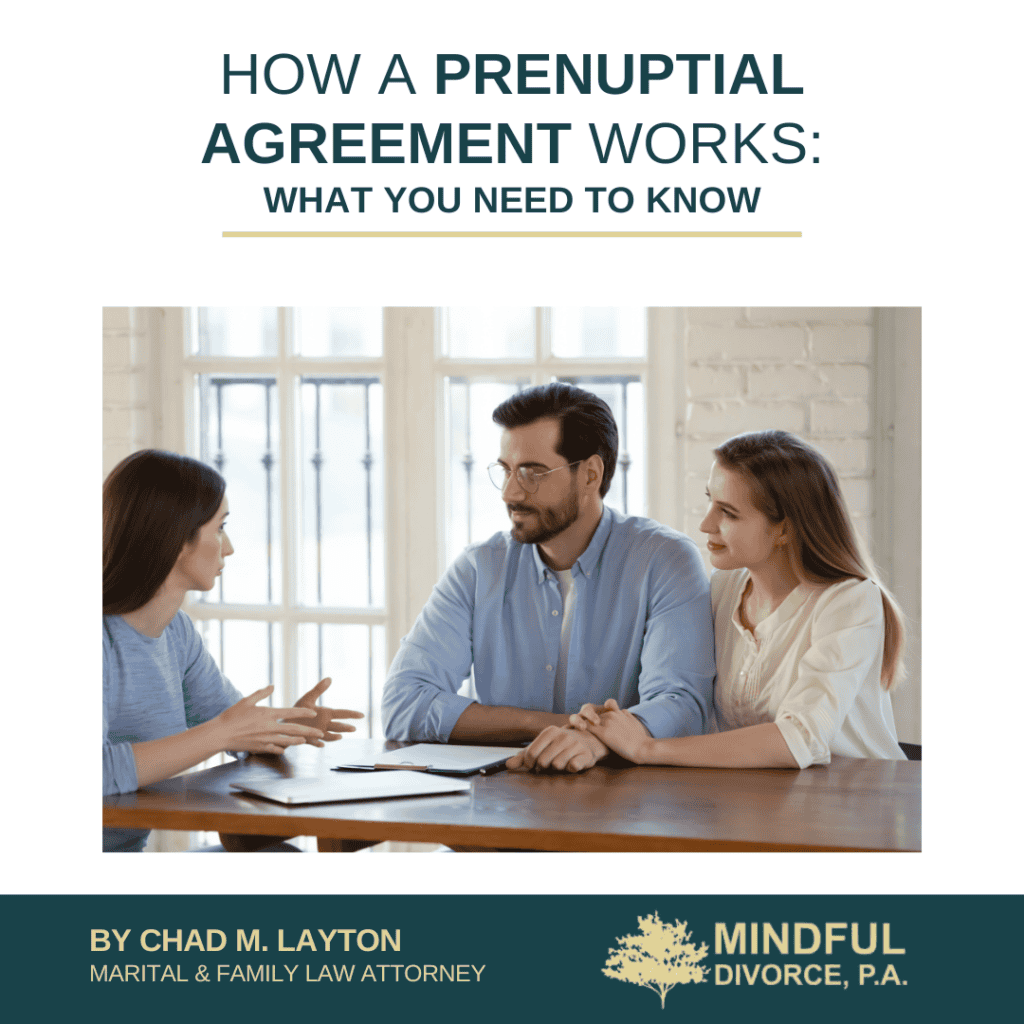
Marriage is more than just a romantic partnership; it’s also a financial commitment. A prenuptial agreement, often called a prenup, is a legal contract that outlines how finances, property, and debts will be handled during the marriage or in the event of divorce or death. While some people hesitate to bring up the idea of a prenup, having a clear agreement in place can help couples start their marriage with transparency and peace of mind.
At Mindful Divorce, P.A., we assist individuals and couples in Florida in drafting prenuptial agreements that protect their financial interests while fostering open conversations about money before marriage. Whether you’re entering a marriage with significant assets, own a business, or want to ensure children from a previous relationship are provided for, a prenup can offer financial security and legal clarity.
What a Prenuptial Agreement Can Cover
Partners can customize prenuptial agreements to fit both their needs. Here are some key areas they typically address:
Division of Property and Assets
A prenup can clarify what happens to the assets each partner brings into the marriage and how property acquired during the marriage will be divided. Without one, Florida law assumes all marital assets should be divided equitably in a divorce, which may not reflect a couple’s wishes.
Alimony or Spousal Support
Couples can use a prenup to set terms for alimony, including waiving it altogether or determining a specific amount or duration. This can help prevent lengthy and expensive disputes later.
Debt Allocation
Many people enter marriage with student loans, credit card balances, or other debts. A prenuptial agreement can specify who is responsible for which debts to avoid unfairly burdening the other’s financial obligations.
Inheritance Rights
A prenup can ensure that certain assets remain with children from a previous marriage or family members rather than becoming marital property subject to division.
Business Ownership
If one or both partners own a business, a prenup can protect the company from being divided or disrupted in the event of divorce. It can also outline how business profits and liabilities are handled during the marriage.
Disposition of Life Insurance Proceeds
A prenuptial agreement can determine who receives life insurance payouts, ensuring the protection of intended beneficiaries.
Creation of Wills or Trusts
While a prenup itself does not replace a will or trust, it can require that certain estate planning measures be taken to uphold the agreement’s terms.
Confidentiality Clauses
Some prenuptial agreements include confidentiality provisions to prevent either spouse from publicly disclosing private or financial information.
What a Prenuptial Agreement Cannot Cover
Prenups cannot determine child custody or support, as courts make these decisions based on the child’s best interests at the time of divorce. They also cannot include provisions that encourage divorce or anything illegal.
The Benefits of a Prenuptial Agreement
While some see prenups as pessimistic, they can actually strengthen a marriage by ensuring both partners understand their financial rights and responsibilities. Some key benefits include:
- Clarity and Transparency Regarding Finances: Having clear financial expectations helps avoid misunderstandings and disputes, making it easier to manage money together.
- Protection of Pre-Marital Assets and Inheritance: If one spouse has assets or inheritance they want to keep separate, a prenup ensures those assets remain theirs.
- Clarifies Responsibility for Premarital Debts: A prenup can prevent one spouse from becoming responsible for the other’s past financial liabilities.
- Protects Business Ownership and Operations: Entrepreneurs can ensure their business remains intact and unaffected by personal marital issues.
- Reduced Conflict and Legal Costs in Case of Divorce: By outlining property division and financial responsibilities in advance, couples can avoid lengthy and expensive court battles.
- Greater Control Over Financial Future: Couples can decide financial matters on their own terms rather than leave decisions up to a judge.
- Peace of Mind for Both Parties: A well-drafted prenup removes uncertainty and provides reassurance for both partners.
Validity and Enforcement of Prenuptial Agreements in Florida
Florida follows the Uniform Premarital Agreement Act (UPAA), which sets specific rules for valid and enforceable prenups:
- Must be in writing and signed by both parties
- Both parties must sign voluntarily, without coercion or duress
- Full and fair disclosure of assets, liabilities, and income by both parties
- The agreement must be fair and not unconscionable
- It should be signed well in advance of the wedding
While independent legal counsel for each party isn’t strictly required, it’s strongly recommended. Courts are more likely to uphold a prenup if both parties have legal representation.
When to Consider a Prenuptial Agreement
A prenup isn’t just for the wealthy. There are many situations where having one makes sense:
- One Party Has Significantly More Assets Than the Other: If one spouse has a higher net worth, a prenup can prevent disputes over wealth division in the future.
- One Party Owns a Business: Business owners can protect their company from being subject to division in case of divorce.
- One or Both Parties Have Children from a Previous Marriage: Prenups can ensure children from prior relationships receive their intended inheritance.
- One Party is Giving Up a Career to Support the Other’s Career: A prenup can provide financial security for the spouse making sacrifices for the other’s success.
- Protecting Family Inheritance: A prenup can specify that inherited assets remain within a certain family line.
- Protecting Against Future Debt Accumulation by One Party: If one partner has concerns about the other’s spending habits, a prenup can outline financial responsibilities and debt liability.
Working with an Attorney to Create a Prenuptial Agreement
Consulting with a knowledgeable family law attorney ensures your prenup is legally sound and enforceable. At Mindful Divorce, P.A., we work closely with clients to draft agreements that reflect their unique needs and circumstances. Our goal is to create fair, clear agreements that provide security and protect the interests of both partners.
Protect Your Future: Contact Mindful Divorce, P.A. Today
A prenuptial agreement is a practical way to safeguard your financial future while strengthening your relationship through honest communication. If you’re considering a prenup, we’re here to help.
At Mindful Divorce, P.A., we offer transparent, fixed-fee services so you can focus on your future without the stress of unpredictable legal bills. Contact us today at (561) 537-8227 to schedule a consultation and take the first step in protecting what matters most to you.



